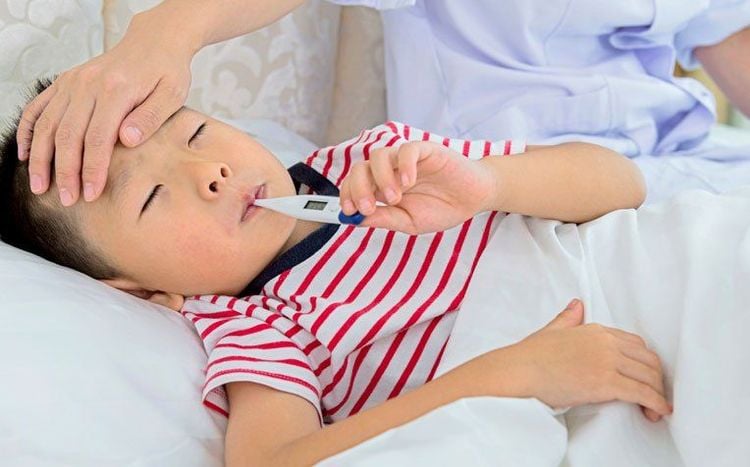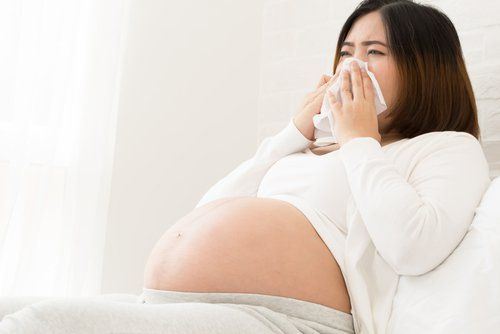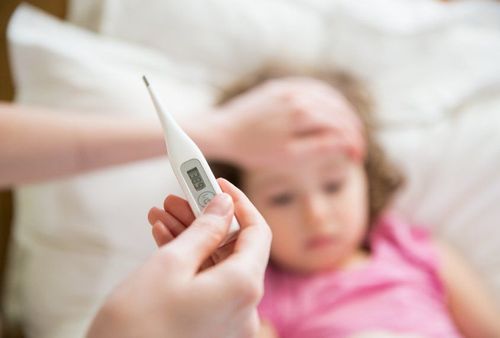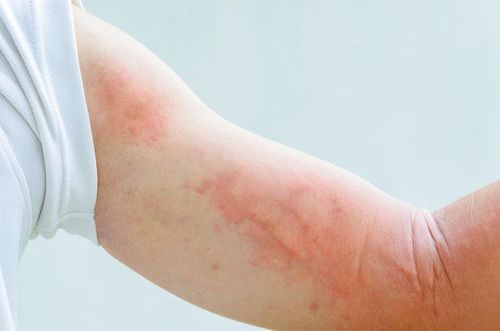The most dangerous stage of dengue fever usually occurs on the third to seventh day after the onset of fever. The patient may still have a fever, or the fever may have subsided, but the patient's physical condition is very weak, showing signs of restlessness, cold extremities, nosebleeds, bleeding gums, and bloody urine and stools.
1. How long does dengue fever last?
The incubation period for dengue fever, from the time of being bitten by an infected mosquito to the onset of the disease, is about 3–6 days, in some cases up to 15 days. The onset of the disease has symptoms similar to many other viruses, including sore throat, watery eyes, conjunctivitis, joint pain, muscle pain (especially in the back muscles), and a high fever (39–40°C). Some accompanying symptoms include thirst, abdominal cramps, digestive disorders, dry skin due to dehydration, and abnormal hot and cold sweating. In paraclinical studies, white blood cells and platelets show signs of decrease, and blood clotting indices are disturbed.
Usually, after three to five days, dengue fever patients begin to have a fever; sometimes the fever may return for one or two days before it is completely gone. If there are no bleeding symptoms, it is called classic dengue, which often occurs in people experiencing the disease for the first time. In people who have had dengue virus, reinfection with a different strain can easily cause dengue hemorrhagic fever, which often occurs in school-age children. However, dengue fever without fever is not uncommon. Sometimes, the symptoms in adults are more severe than in children. Infants and young children need special monitoring when they have dengue fever. How long dengue fever lasts depends on the time of detection, treatment, and the patient's condition. If detected and treated promptly, dengue fever will last 7–10 days.
2. The most dangerous stage of dengue fever

The most dangerous stage of dengue fever usually occurs from the third to seventh day after the onset of fever. The patient may still have a fever, or the fever may have subsided, accompanied by symptoms such as plasma leakage (due to increased vascular permeability, usually lasting about 24–48 hours), pleural effusion, interstitial tissue edema, peritoneal edema, eyelid edema, and hepatomegaly, which may cause pain. If there is significant plasma leakage, dengue fever patients are prone to shock, with symptoms such as restlessness, lethargy, cold extremities, cold, clammy skin, a rapid heart rate, oliguria, and narrow pulse pressure (a condition where the difference between systolic and diastolic blood pressure is 20 mmHg or less); blood pressure may drop or be unmeasurable.
In this stage, bleeding symptoms manifest as petechiae or purpura under the skin, mucous membranes, and internal organs. Hemorrhage is often seen on the anterior legs, inner abdomen, thighs, and ribs. Patients with mucosal bleeding may experience epistaxis, bleeding gums, hematuria, menorrhagia, or metrorrhagia. Signs of internal bleeding may occur in the gastrointestinal tract, lungs, and brain and are often severe. Additionally, some severe dengue fever cases may exhibit organ failure, such as severe hepatitis, encephalitis, and myocarditis. These severe symptoms can occur in some patients without obvious signs of plasma leakage or shock. Therefore, clinical diagnosis requires vigilance. Paraclinical tests may show an increased hematocrit compared to the initial value or age-matched population average, decreased platelet count, and often increased liver enzymes. In severe cases, signs of coagulopathy will appear. Ultrasound or X-ray may detect ascites or pleural effusion.
3. What should I do if I have dengue fever?
Dengue fever patients need rehydration. To improve treatment effectiveness, shorten the disease duration, and limit symptoms, dengue fever patients should do the following:
- Replenish fluids: Drink water, such as filtered water, ORS solution, orange juice, coconut water, etc. Children with the disease should eat soft foods to ensure balanced nutrition. Avoid carbonated drinks, fast food, spicy food, and foods that are too hot or cold.
- Avoid mosquito bites to prevent further illness: Sleep under mosquito nets, even during the day, and close curtains to limit mosquito entry. Do not let children play in dark, damp areas or near stagnant water. During epidemic seasons, wear long sleeves and use mosquito repellent creams and oils. Regularly clear bushes, eliminate stagnant water, kill larvae, and cover water containers to prevent mosquitoes from laying eggs. Regularly clean the house and surrounding areas to ensure they are clean and well-ventilated. Do not hang too many clothes to avoid creating mosquito hiding places.
In particular, when detecting signs of suspected dengue fever, patients should go to a medical facility for examination, diagnosis, and appropriate treatment. Delayed treatment puts dengue fever patients at risk of death due to serious complications.
To arrange an appointment, please call HOTLINE or make your reservation directly HERE. You may also download the MyVinmec app to schedule appointments faster and manage your reservations more conveniently.
To arrange an appointment, please call HOTLINE or make your reservation directly HERE. You may also download the MyVinmec app to schedule appointments faster and manage your reservations more conveniently.








